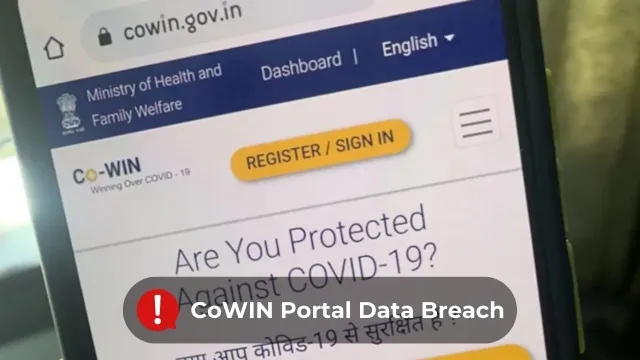Recent revelations surrounding the alleged data breach of India’s CoWIN portal have triggered widespread apprehension about the security and privacy of personal data. While the government denies any breach, experts are urging the implementation of stringent rules and enhanced compliance measures. The incident, which initially surfaced on social media and gained attention when a Malayalam news portal reported accessing the data on Telegram, has raised questions about the safety of sensitive information and the adequacy of India’s cybersecurity systems. This article delves into the details of the incident, explores the recurring nature of data leaks, and emphasizes the pressing need for robust data privacy laws and comprehensive security measures.
The CoWIN Portal Incident Unveiled

On June 5, Rakesh Krishnan, a senior threat analyst, took to social media platforms to claim that the CoWIN portal had been hacked and its data exposed to the public. However, the issue only gained prominence when a Malayalam news portal disclosed its access to the data on Telegram. Further investigations revealed that a Telegram bot had facilitated the retrieval of the personal information of individuals who had registered for Covid-19 vaccinations on CoWIN. The shocking revelation raised concerns, considering the portal’s extensive reach, touching the lives of over a billion people within a short span of 18 months.
The Stolen Data: Past or Recent?

The origin and timeline of the data breach remain uncertain. Rakesh Krishnan identified the data leak in an Indonesian Telegram channel, where similar breaches are frequently publicized for sale. According to his conversation with the threat actor responsible for posting CoWIN’s data, the information had been in their possession for approximately a year. Despite reporting the breach to the government, no action was taken, and the data resurfaced for sale. The hacker demanded payment in cryptocurrency, emphasizing the need for enhanced security measures to combat cyber threats effectively.
Government Denials and Past Breaches

In response to the incident, Union Minister of Electronics and Technology Rajeev Chandrasekhar refuted claims of a CoWIN data breach, asserting that a Telegram bot was randomly displaying data from a threat actor database. However, this assertion has failed to address the concerns surrounding the accessibility and misuse of personal information. This incident, coupled with previous breaches in 2021 and 2022, exposes India’s vulnerability to cyberattacks and underscores the need for stronger cybersecurity infrastructure. In the past, the government denied such claims, only to witness their resurfacing and subsequent dismissal, leaving citizens apprehensive about the safety of their data.
Persistent Data Leaks and the Need for a Data Privacy Law

Instances of personal data leaks have become worryingly recurrent. Harshil Doshi, Director of Sales at Securonix, explains that sensationalizing these leaks for political reasons overshadows the crucial need for an objective discussion on a nationwide policy regarding data security and sovereignty. While leaked personally identifiable information (PII) data may be publicly available, critical services like banking and social media employ multi-factor authentication methods to prevent unauthorized access. However, these breaches highlight the urgency for comprehensive data privacy legislation to effectively protect citizens’ sensitive information.
Lack of Regulatory Framework and Compliance

India currently lacks a robust regulatory framework and due compliance with data privacy laws. The absence of stringent measures and a proactive approach towards data protection raises concerns about the government’s handling of citizens’ data. Advocate Liza Vanjani emphasizes the need to prioritize data security and calls for informed communication with users regarding any potential data breaches. The government’s “Digital First” initiatives aimed at enhancing public services may face setbacks as citizens question the overall efficacy and security of digital platforms.
The Urgent Call for Accountability and Data Protection Measures

In the wake of the CoWIN data breach, determining accountability becomes paramount. Establishing clear measures of responsibility is crucial for addressing the breach, mitigating its impact, and preventing future incidents. This alarming episode underlines the urgency for robust data protection laws and stringent security measures to effectively safeguard citizens’ sensitive information. Moreover, empowering individuals to exercise their “Right to be Forgotten” and enabling the deletion of personal data from government databases is essential to protect privacy rights and restore public trust.
The alleged data breach of the CoWIN portal has ignited widespread concern about the security and privacy of personal data in India. While the government denies any direct breach, experts emphasize the urgent need for stringent rules and compliance measures. The recurring nature of data leaks and the absence of a comprehensive data privacy law highlight the vulnerability of India’s cybersecurity systems. To foster a secure digital ecosystem and regain citizen trust, robust data protection legislation, accountability measures, and enhanced security protocols are imperative. Preserving the privacy and security of individuals’ data must remain a top priority to mitigate the risks posed by cyber threats in an increasingly digital world.







